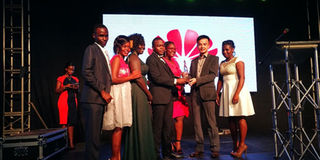Investing in ICT will improve the learning process

Blurb: In December 2014, the United Nations General Assembly adopted a resolution declaring 15th July as World Youth Skills Day, with a goal of achieving better socio-economic conditions for today’s youth as a means of addressing the challenges of unemployment and under employment.
Evelyn Namara is the founder and chief executive officer of Vouch Digital, a technology start-up that is building a verified voucher system, M-Voucher, for simplifying the distribution of international and national aid.
This electronic voucher system eliminates fraud and corruption in the process of distribution by eliminating the use of cash and introducing digital cards that programme participants use to redeem life-saving goods and services from merchants, agro-dealers and shopkeepers.
On July 9, 2012, the former secretary general of the United Nations, Ban Ki Moon, in his closing remarks at a High-Level Panel on Accountability, Transparency and Sustainable Development noted that 30 per cent of development aid is lost to fraud or corruption. He attributed this to a rule of law which is fragile, institutions that are weak and a failure of accountability and transparency in dealing with money.
His speech inspired Namara to come up with the M-Voucher. “My team did the first implementation using a one-time scratchable voucher card system. This voucher type was meant for beneficiaries in remote areas where the use of smart phones was not possible. Our system generated voucher numbers, which we printed on physical voucher cards and allowed agro-dealers to redeem using their mobile phones for beneficiaries. ” Namara said.
The system can be deployed and replicated anywhere in the world where distribution is a problem. Namara has been working with international development agencies and facilitated the distribution of seed crops, fertilisers, and farming equipment. So far the system has facilitated over Shs3b in transactions by ensuring verified participants receive verified products and services and that every transaction is tracked in real-time.
Investing in ICT
When Uganda developed its initial information, communications and technology (ICT) national framework, the policy recognised the need to embrace lifelong education for all. Among the issues that the policy was looking at were literacy improvement and human resource capacity-building.
Currently, all secondary schools and some primary schools are teaching ICT. According to Moses Owek, an ICT teacher at Namagunga Day and Boarding Primary school, integrating ICT into the curricula provides equitable access of learning to all students regardless of the level.
“Embracing science and technology will undoubtedly improve students learning process. Instead of students reading many textbooks, with ICT they can browse the internet and find their research with just a click a mouse,” he notes, adding that science and technology is engaging and can break the traditional classroom boredom.
Emmanuel Mugarura, the head of Kampala Smart School, says teaching strategies based on technology boost students capacity and performance.
“Today, many students are addicted to Facebook, Instagram and WhatsApp. You can use their inclination to spend time online for a good purpose - making learning enjoyable. Use touch-screen technology and online presentations to make the classes more interactive. You can also rely on technology when you want your students to take part in discussions by setting up a private Facebook group for your class,” he says.
Mugarura contends that science and technology has made teaching easy because he or she can download learning aides from internet.
Training human resource
Embracing technology is key in a student’s learning process and the government is closing the existing digital divide through the Presidential Initiative on Science and Technology, the creation of the Uganda Industrial Research Institute (UIRI), the Uganda National Council of Science and Technology (UNCST), and Makerere University Institute of Science and Technology/Food Science.
However, developing and managing ICT centres of excellence to provide basic and advanced ICT training is still a challenge. The country is still struggling with setting up mechanisms that promote collaboration between industry and training institutions to build human resources capacity.
“There are few teachers of ICT and this is a challenge in rural areas. In areas where access to the Internet is not affordable, students and teachers cannot effectively use technology,” Owek says.
The advancing ICT helps in addressing social and economic problems caused by the fast growth of urban youth populations. It offers opportunities for learning, skills development and employment. However, just because the technology trend is fast setting in does not mean that the level of innovation is synonymous with the trend.
Awards foster innovation
Recently, Uganda Communications Commissions held its Annual Communications Innovation Awards (ACIA) and Namara won the ICT for Development award. The awards are held with sponsorship from Huawei and other organisations.
Namara’s innovation was chosen as the best agricultural app at the MTN Innovation awards, and she was chosen as the outstanding woman in innovation at the same awards. She also applied for the Cartier Women’s Initiative Awards and emerged one of 18 finalists selected from 2,800 applications. Being a finalist came with a cash prize and mentorship in business modeling and financial education.
“Like people of my age who want to start a business, I used to lack confidence in myself. These awards especially the first one ICT for Development award really encouraged and motivated me to explore into the unknown. I am now continuing to focusing on our new digital identity and block chain product that will make distribution even much easier,” she says.
A changing world
For Nelson Kajura, a teacher at Buhinga Primary School, the world is moving fast. “We need to embrace technology because this is the only way our country can develop. The use of science and technology is a brilliant move but for the students, it is important that they only use technology for educational purposes. They should not use it for the wrong reasons.”




